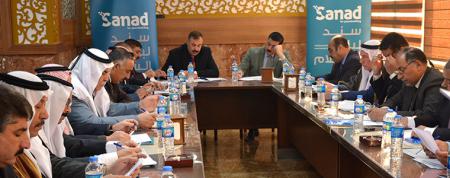Fri, Feb 10, 2017
As Extremists’ Power Wanes, Tribal Leaders in Hawija Accept ‘Official Justice’
Published: February 9, 2017
By: Fred Strasser
When Iraqi tribal leaders were forced to flee the city of Hawija in northern Iraq as the Islamic State seized the area in 2014, they weren’t much concerned with advancing the rule of law. But last year, as ISIS’s grip weakened and the possibility of returning to Hawija grew nearer, the leaders faced the prospect of an aftermath stained by revenge killings of collaborators and demand for “blood money” in compensation. Such tribal justice could set off new rounds of violence and instability.
Over the course of 2016, their perspective on the value of official justice mechanisms began to shift, as the result of a series of dialogues and consultations organized and led by two Iraqi groups, Sanad for Peacebuilding and the Network of Iraqi Facilitators (NIF), both supported by the U.S. Institute of Peace.
The deputy governor of Kirkuk Province had asked USIP how to ensure that the peace that would come with the liberation of Hawija could be sustained over the long term. Iraqi forces, backed by a U.S.-led military coalition, already have recaptured parts of Mosul to the north, and Hawija’s displaced tribal leaders hope their city will not be far behind. The top U.S. commander in Iraq told the Associated Press this week that the remainder of the Mosul operation should be completed within six months.
As a result of the Kirkuk deputy governor’s request, Sanad and NIF organized a series of dialogues and consultations with 51 anti-ISIS tribal leaders and local authorities. The thorniest question that emerged was how to deal with ISIS members, collaborators and their families once the area is recaptured, said Osama Gharizi, USIP’s regional program manager for the Middle East.
The answer came in a pact unveiled in Kirkuk on Jan. 15 that, at its core, pledged respect for the rule of law. The accord, supported by the governor of Kirkuk Province and the mayor of Hawija, was the latest in a series of local reconciliation agreements that have emerged from dialogues shepherded by Sanad and NIF and supported by USIP. The aim is to reduce the risks of future outbreaks of violence caused by tensions that seed the terrain for violent extremism. In the process, USIP and its civil society partners also work with authorities of the government in Baghdad, including the National Reconciliation Committee of Prime Minister Haider al-Abadi’s Office.
“If you strike a national peace accord for Iraq in Baghdad, it won’t solve the situation in Kirkuk,” said USIP Middle East Director Sarhang Hamasaeed “But if you succeed on the ground in places like Kirkuk, that will increase the chances of a national accord. We have to work from the bottom-up and from the top-down.”
A Crucible for ISIS
Hawija was a kind of crucible for ISIS, which claims to represent Sunni Islam. With a population of 275,559 in 2012, the city lies in the almost entirely Sunni area of southwestern Kirkuk Province, an area that U.S. and Iraqi forces never fully controlled after the U.S. invasion in 2003. Subsequently, as the Sunni community felt the policies of then-Prime Minister Nouri al-Maliki’s government in Baghdad marginalized and alienated them from state institutions and mechanisms, tribal identity strengthened, rule of law suffered, and tribal law and practices filled the gap, Hamasaeed said.
Conditions on the ground spiraled downward in April 2013, when a violent government crackdown on disaffected Sunni protesters left 50 civilians dead and more than 150 injured. The death toll in the following week reportedly rose to more than 200.
While ISIS has roots in Al-Qaeda in Iraq, an earlier terrorist organization, its explosive rise in 2014 was fueled by incidents like the Hawija massacre and by government policies that Sunnis say drove some to support the insurgents, Hamasaeed said. By June 2014, ISIS had seized Hawija and much of southern Kirkuk.
To monopolize power, ISIS sought to destroy “the longstanding bonds and peaceful relations” in the region with “atrocious crimes” against innocent civilians, according to a statement issued by Sanad for the announcement last month.
Some tribal leaders or members had sided with ISIS, others were forced to support the group under threat, and others fled rather than pledge loyalty to the organization or face execution of their entire families, Hamasaeed said.
To read the full piece from United States Institute of Peace, click here.

